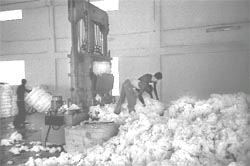Fabric of nature
Fabric of nature

there is a growing demand for organic cotton in various parts of the world. Grown without the use of synthetic chemical fertilisers and pesticides that conventional cotton cultivation is still dependent upon, organic cotton is gaining wider recognition than ever before. Global production of organic cotton increased from 8,250 tonnes in 1997 to 14,752 tonnes in 1999. According to estimates, 10 per cent of cotton production in the world was organic in 2000.
Already there is a growing body of informed consumers who are ready to take environmental and social issues into account in their buying preferences.
India has great potential for organic cotton. "But this potential will not be realised as long as purchase and free export of raw cotton and cotton textiles rests in the hands of governmental bodies and multinationals,' says Marck Van Esch, managing director of BoWeevil B V, a textile company based in Holland.
Of the total pesticides used in agriculture in India, 54 per cent is used in cotton cultivation. This despite the fact that cotton cultivation accounts for a mere five per cent of the total land under cultivation. The insecticides applied on cotton include methamidophos and monocrotophos







